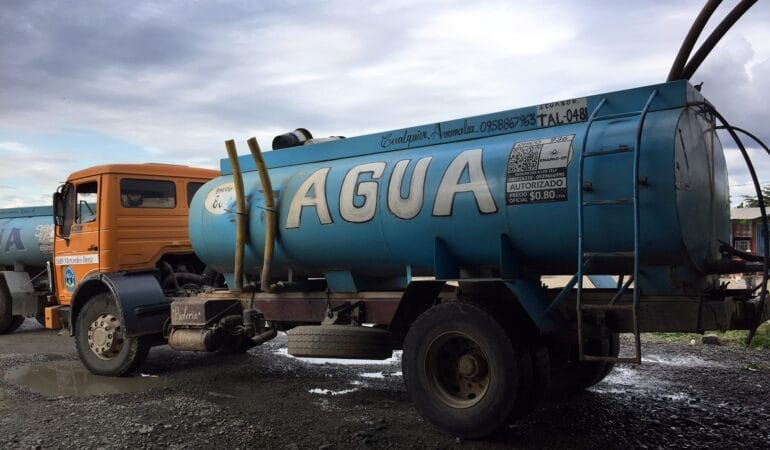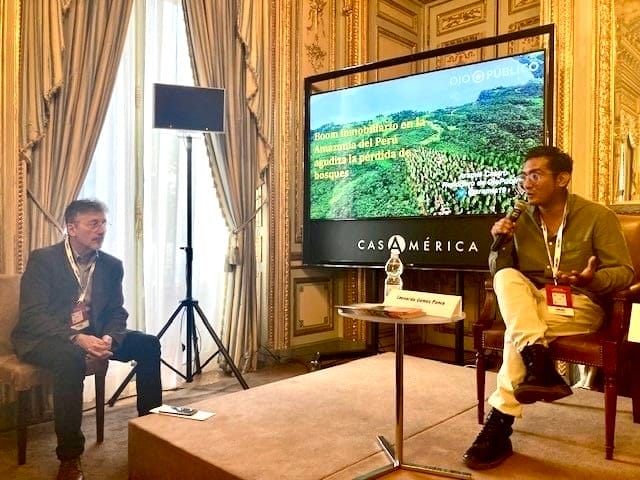
Third Annual Lincoln Award Recognizes Land Policy Reporting in Latin America
In the Ecuadorian city of Durán, more than 70 percent of the estimated 325,000 residents have no drinking water or sewage service. They must purchase water trucked in by tanker companies—a precarious, seemingly untenable situation that has persisted for almost 40 years. When a team of journalists set out to investigate the reasons for Durán’s inadequate water infrastructure—and uncovered some of the government obscuration and private-sector corruption behind it—they began to receive threats of violence.
The team persevered, however, and published a multimedia investigative series that describes in vivid detail how collusion between government actors and the private sector has restricted access to the basic service of drinking water for most of Durán’s population. This fall, the Lincoln Institute of Land Policy recognized the work of two journalists involved with the project—Leonardo Gómez Ponce and another whose name is being withheld due to ongoing threats—with the 2024 Lincoln Award (Premio Lincoln) for Urban Policy, Sustainable Development, and Climate Change Journalism. Both recipients are part of the Unidad de Investigación Tierra de Nadie (No Man’s Land Research Unit). The award, now in its third year, was presented as part of the prestigious 2024 Latin American Conference of Investigative Journalism (COLPIN), and recognizes the best land policy journalism in Latin America and the Caribbean.
Ponce and other Premio Lincoln winners joined a roundtable discussion, moderated by Lincoln Institute Senior Program Manager Laura Mullahy, on Day 3 of the annual COLPIN conference, held this year in Madrid. The four-day event was organized by the Lima, Peru–based Instituto Prensa y Sociedad (Press and Society Institute), or IPYS.

Journalists submitted 265 entries for the Premio Lincoln this year, Mullahy says—more than double the number received in each of the first two years—and the entries were all over the map, both literally (representing 63 cities in 22 countries) and topically. Water shortages, climate change, and housing were prevalent subjects, as were investigations on land conflicts, climate migration, informal settlements, and illegal or unjust land use.
Mullahy says the depth and tenacity of the reporting was inspiring. Some of the winning journalists had been pursuing stories for several years. “I get sort of emotional about these awards,” she says, “because these are such dedicated people.” Mullahy was also proud that two of the winners had participated in Lincoln Institute courses for Latin American journalists in the past, which were designed to introduce them to core concepts of land policy.
Below, find the winners of the 2024 Lincoln Award for Journalism on Urban Policy, Sustainable Development, and Climate Change, along with links to their work. (See the 2023 winners here.)
2024 Premio Lincoln Winners
First Prize: Leonardo Gómez Ponce and colleague for the series, “Durán, los hijos del tren y las mafias del agua” (“Durán: The Children of the Train and the Water Mafias”), a years-long investigation published by Ecuador’s Tierra de Nadie.
The online platform for this multi-part, data-rich investigative series opens with a real-time counter tallying the more than 38 years—every month, day, hour, second—that 70 percent of residents in the city of Durán, Ecuador, have gone without drinking water or functioning sewer systems.
“This is an example of how unscrupulous businesses can limit the planning and development of a city’s infrastructure,” Mullahy says. “The selection committee valued the investigative quality, the contribution of data and supporting documentation, and the clear demonstration that without infrastructure of basic services, populations remain in poverty and no progress is possible.”
Second prize: Alexánder Marín Correa, Juan Camilo Parra, Miguel Ángel Vivas, Camilo Tovar Puentes, María Angélica García Puerto, and Juan Camilo Beltrán, for “Escasez de agua en Bogotá: ¿Cómo llegamos a este punto?” (“Water Shortage in Bogotá: How Did We Get to This Point?”), published by El Espectador in Colombia.
Produced by a group of journalists from Colombian newspaper El Espectador, this article chronicles how a combination of historical, environmental, and management factors led to a health catastrophe in Bogotá.
The article recounts how Colombia’s capital city has experienced rapid growth and increased demand for water, all while deforestation and climate change have diminished water sources. The situation is aggravated by river pollution and the lack of adequate infrastructure. The article clearly shows that water management has been inefficient, leading to distribution problems and inequitable access. This context poses an urgent challenge to guarantee the sustainable supply of water to the people of Bogotá.
Third prize: Aramís Castro, for “Boom inmobiliario en la Amazonía del Perú agudiza la pérdida de bosques” (“Real Estate Boom in the Peruvian Amazon Exacerbates Forest Loss”), published by OjoPúblico in Peru.
Castro’s article analyzes how real estate speculation is contributing to deforestation in the Peruvian Amazon, demonstrating how the sale of rural land is transforming regions such as San Martín and Ucayali, where thousands of hectares of forests have already been lost.
Castro analyzed hundreds of social media advertisements and found that private real estate companies were promoting renderings of modern buildings in wooded, natural settings, luring buyers with slogans like, “The new Miami in the Peruvian jungle.” But many of the rustic lots lack even basic water or sewerage services, and often contribute to the degradation of the ecosystem. The research shows how the lack of regulation and control in the sale of land aggravates deforestation, biodiversity loss, and other environmental issues.

Honorable Mention 1: Lucía Viridiana Vergara García, Darío Ramírez, Isabel Mateos, Rodrigo Flores Esquinca, Alonso Esquinca Díaz, Erick Retana, Eduardo Mota, and Eduardo Buendía, for “Aquí no cabe un tren” (“There’s No Room for a Train Here”) and “La Sedena arrasó la selva para construir 6 hoteles del Tren Maya” (“Sedena Razed the Jungle to Build 6 Mayan Train Hotels”), produced by Mexicanos contra la Corrupción y la Impunidad in Mexico.
This article and accompanying podcast look at how the construction of the Mayan Train in Mexico—and the new hotels linked to this mega-project—could cause irreversible damage to the environment, contradicting arguments for developing the regions through which the train will pass. The work clearly and creatively explores the topic with rich testimonials, and raises a range of issues with the project, from the felling of trees and the lack of technical and scientific studies of its environmental impacts, to the effects of construction in protected archaeological areas and a biosphere declared a UNESCO World Heritage site in 2002.
Honorable Mention 2: Daniel Fonseca for “¿Dónde vamos a vivir? Datos, proyectos e intentos de solución al problema de vivienda en América Latina” (“Where Are We Going to Live? Data, Projects, and Attempted Solutions to the Housing Problem in Latin America”), published by Distintas Latitudes, Honduras.
This journalistic investigation, carried out for Distintas Latitudes by the seventh generation of the LATAM Network of Young Journalists, explores the housing crisis in Latin America from different angles. It highlights problems such as access to housing, the increase in inequality, and the lack of inclusive policies for vulnerable groups such as youth, women, and the LGBTI community.
The series examines the dynamics of unplanned urban growth and how governments have failed to adequately address the demand for decent housing—and seeks to shed light on current conditions and propose solutions to guarantee the right to adequate housing in the region.
Honorable Mention 3: Aitor Sáez for “Aguas revueltas: sequía y saqueo en México” (“Troubled Waters: Drought and Looting in Mexico”), published by Pie de Página, Mexico
This investigative series describes the water crisis in 12 regions of Mexico. The report reflects the different conflicts related to the lack of water, which result from both the climate crisis and direct human intervention, especially through the coercion of organized crime.
Honorable Mention 4: Miguel Ángel Dobrich and Gabriel Farías, for “De la sequía a la inundación: el impacto sobre el trabajo en la zona costera de Uruguay, de Este a Oeste” (“From Drought to Flood: The Impact on Work in the Coastal Zone of Uruguay, from East to West”), published by Amenaza Roboto in Uruguay.
This article explores the impact of climate change on working conditions in different areas of Uruguay, from Valizas to Ciudad del Plata, describing how extreme weather affects artisanal fishermen, domestic workers, and other people who depend on vulnerable ecosystems. It also addresses inequality and flood risk in coastal communities. The research combines geospatial data and advanced visualization to show the impact of these changes.
Honorable Mention 5: Vinicius Sassine and Lalo de Almeida for “Cerco às aldeias” (“Siege of Villages”), published by Folha de São Paulo in Brazil.
This piece describes how mining companies, or garimpos, rob land, water, and health from the Mundurukus, Kayapós, Nambikwaras, and Yanomami–Indigenous groups of the Brazilian Amazon. In the areas where these mining companies operate, inhabitants suffer from illnesses due to contact with mercury, the toxic heavy metal used to separate gold from the ground. Children are diagnosed with cognitive delays, and adults with physical illnesses. However, the Brazilian government has no plans to put a stop to illegal mining.
Lead image: A truck brings water to Durán, Ecuador, where nearly 70 percent of residents have lived without drinking water for decades. A multiyear project investigating this crisis recently won a Lincoln Institute journalism award. Credit: Unidad de Investigación Tierra de Nadie.
